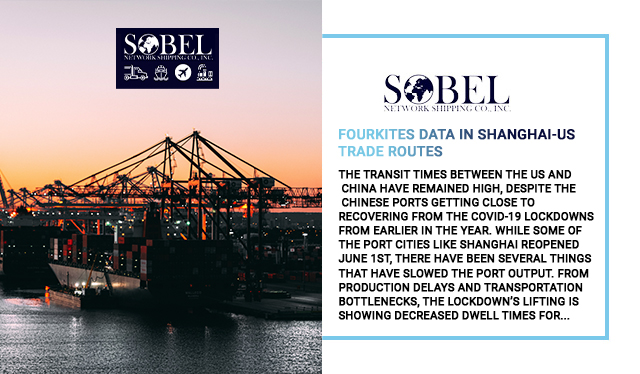The transit times between the US and China have remained high, despite the Chinese ports getting close to recovering from the COVID-19 lockdowns from earlier in the year. While some of the port cities like Shanghai reopened June 1st, there have been several things that have slowed the port output. From production delays and transportation bottlenecks, the lockdown’s lifting is showing decreased dwell times for exports, but the average transit for loads is still longer than usual according to the data put together by FourKites, a supply chain visibility company.
While the lockdown aided the inland transportation in China, the opening of it has caused capacity to get tighter, according to Raj Patel, Vice President of third-party logistics at FourKites.
What would normally take two weeks for shipment volume for loads is down 3%, compared to the 43% decline in April, FourKites data said. There is still 37% in delayed shipments, compared with the 39% in April. Averaging 60 days for transit time between the US and Shanghai, this time is up 51% to 75.6 days compared with pre-lockdown times before March 12th. Dwell times for exports, however, are getting better with a decreased overall 4% to 6.5 days, down overall from the 27% in June. Imports dwell times, on the other hand, have remained higher than pre-lockdown levels.
The US President, Joe Biden, is considering removing or extending tariffs 301, 201, and 232 set up by former President Donald Trump. These tariffs cover approximately $370 billion in Chinese imports, and could help ease inflation should they be removed. The removal has a strong rebuttal against it, however, from places that have organized labor.
“Many tariffs imposed represent interests directly impacting individual union members,” Thomas Conway, chairman of the Labor Advisory Committee for Trade Negotiations and Trade Policy, said in a letter. “Other tariffs support the overall level of retaliation that is appropriate to respond to China’s unfair, predatory and protectionist trade policies.”
Here at Sobel, we understand the complexities of the supply chain including its many disruptions, but are here to navigate the rocky waters with you. We will continue to monitor the tariff situation as well as the bottlenecks in China and keep you up to date with the latest news and events regarding them. If you have any questions please contact your Sobel representative today.


